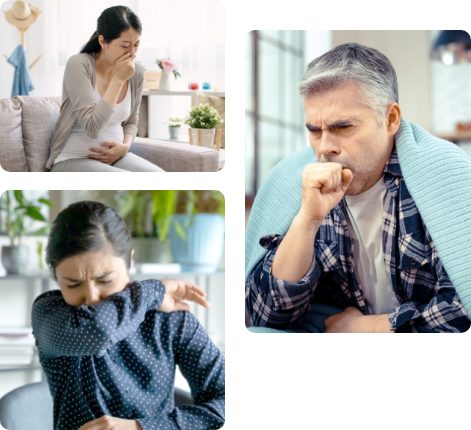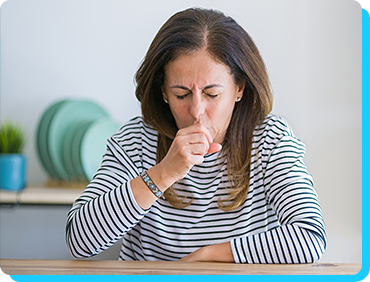Whooping cough symptoms
Whooping cough is a highly contagious disease caused by Bordetella pertussis, bacteria that affect the lungs and airways. Understanding the symptoms of whooping cough can help people better protect themselves and those around them.

Signs & symptoms
Symptoms of whooping cough can change as the illness progresses and may be different in babies, young children, and adults. One of the most distinct symptoms is the loud, high-pitched “whoop” sound that may occur between coughing fits as you try to take in breaths.
Early symptoms
Whooping cough can start with cold-like symptoms: a runny nose or congestion, sneezing and mild cough, or mild fever.
Worsening cough
After one to two weeks, the cough can worsen due to thick mucus in the airways. Coughing fits usually become more frequent and get worse as the illness continues. Violent, uncontrollable coughing fits can go on to disrupt life for weeks or a couple of months.
Nighttime cough
Patients may have sleep disruptions or difficulties sleeping for weeks to months due to coughing fits that often occur at night.

Understand the risk
Anyone can get whooping cough, at any age. Babies are at the most risk for serious illness, but whooping cough isn’t just for kids. Though complications are sometimes less serious in older age groups, the violent coughing fits are sometimes followed by vomiting and exhaustion and can disrupt sleep for a period of weeks to months.
Is whooping cough contagious?
Whooping cough is highly contagious, and some people who spread whooping cough may not even know they have it. The bacteria that cause whooping cough spread easily through coughing or sneezing while in close contact with others, especially within households.
Press play to hear an adult with whooping cough
Whooping cough in adults
In adults, early-stage whooping cough lasts one to two weeks and looks much like the common cold, with symptoms like runny nose, low-grade fever, and occasional cough.
In its later stages, though complications are less serious in older adults, the violent coughing fits are sometimes followed by vomiting and exhaustion and can disrupt sleep for weeks to months.
Press play to hear a child with whooping cough
Whooping cough in children
In children, early-stage whooping cough looks much like the common cold, with symptoms such as runny nose, mild fever, and occasional cough that last for one to two weeks.
In later stages of whooping cough, children might have rapid coughing fits that follow with a “whoop” sound. Children will sometimes cough so much that they vomit and feel exhausted afterward.
Whooping cough in infants
Whooping cough can cause severe illness in babies. In its early stages, it can look like the common cold, with symptoms like runny nose, mild fever, and occasional cough.
In later stages of whooping cough, babies might have rapid coughing fits followed by a “whoop” sound and become exhausted afterward. But many young infants don’t cough at all, or may also have a pause in breathing, called apnea, and turn blue. You should immediately call for emergency help if that happens.
Is it whooping cough, or something else?
In its early stages, whooping cough symptoms can resemble those of a cold. However, whooping cough worsens with time, with symptoms that may become more serious.
It’s important to recognize the symptoms of whooping cough to help your healthcare professional diagnose it early. Getting the vaccine to help prevent whooping cough can help reduce risk of disease.
How whooping cough develops and progresses over time
Whooping cough has three stages. How long whooping cough lasts can vary from person to person. Whooping cough symptoms may look different in children and adults.
Stage 1
Highly contagious
Runny nose
Low-grade fever
Mild, occasional cough
First 2 weeks
Stage 2
‘Whoop’ cough
Fits of several rapid coughs, followed by ‘whoop’ sound
Vomiting or exhaustion after coughing fits
Many young infants may not cough at all but instead have a pause in breathing and may turn blue
Lasts 1-6 weeks
Can sometimes extend up to 10 weeks
Stage 3
Susceptible to respiratory infections
Recovery is gradual
Coughing lessens, but fits of coughing may return
Lasts 2-3 weeks

Whooping cough treatments
For people diagnosed with whooping cough, there are treatment options available to help treat the infection that causes the disease. If you or someone in your family is experiencing the symptoms of whooping cough, talk to your doctor right away.


